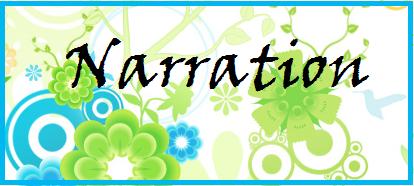
Shannon asked in a comment, “I would love to read more about narration… including examples of what to expect at different stages of reading and writing.”
This is such a great question and so hard to answer! Each child is different and develops at his own unique pace. But I’ll try to address the question.
First of all, if you are using narration from an early age, the development to more complex narrations will be natural. On the other hand, if you are starting to use narration with an upper elementary or older student, you may be discouraged when narrating is difficult. (I’ll be sharing more on dealing with specific narration problems in another post, so stay tuned.)
Narrating is a skill that has to be developed. Those early years of oral narration are foundational. But if that foundation was not laid, it can certainly be laid later on. It will probably take more effort because the nature of the material being narrated is going to be more challenging that the lessons a child had in early grades.
Here are my guidelines. These may not be exactly what a Charlotte Mason purist would say. But this is what I personally expect for my child. Adapt it for your own particular needs.
Narrating for Early Grades K-2
Narration at this stage is oral. You read out loud and your child tells you back what he heard. You start with small chunks — a few paragraphs, then a page, and finally a chapter. If your child can identify the main idea of the lesson and tell back the most important details, he is narrating successfully at this age.
If narration is written, it can be “fun” such as drawings or lapbooks. Simple lapbooks (actually the minibooks inside the lapbook) that divide information visibly into chunks help children see the organization of ideas in their lessons. This may not seem critical to you, but it lays a foundation for outlining and writing in later years. Try to choose minibooks that fit the content — a book with four flaps for four types of something, a wheel with three windows for three steps in a process, etc. Mentally organizing information is what narration and composition are about.
Sample “Written” Narrations from K-2
Narrating for Intermediate Grades 3-5
Narration during this stage is still heavily oral but written narrations are introduced. Children can write sentence and then paragraph narrations of their lessons. As you shift from oral to written narrations, you may want to go back to even smaller chunks of information than you had built up to. For example, if your third grader can narrate a chapter orally, when he narrates in writing, give him only a page worth of information. The format of the narration is more difficult, so adapt the amount of material. This increases incrementally until a fifth grader is occasionally doing written narrations of multi-page reading selections. I would recommend a written narration once or twice a week for a fifth grader.
You are probably still doing a lot of reading out loud, and there is plenty of oral narration continuing. The oral narrations can begin to extend beyond a strict retelling and include original thoughts, conclusions, and evaluations of the lesson material.
You can still effectively use lapbooks for narration. You will probably want to begin some notebooking at this stage too.
Sample Fifth Grade Written Narrations
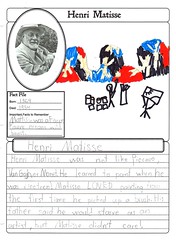

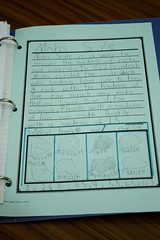
Narrating for Middle School Grades 6-8
During middle school years, encourage your child to move more and more to written narrations. Require written narrations more often and in greater length.
More than likely, your child will outgrow lapbooks and move into notebooking. The notebooking can still include creative elements such as drawings, graphic organizers, timelines, and interviews. But the narrations become more and more text based with written words becoming the primary way of communicating ideas.
Oral narrations are still used. These are great time savers compared to written narrations and enable you to quickly check for understanding.
Sample Sixth Grade Written Narrations
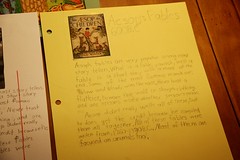
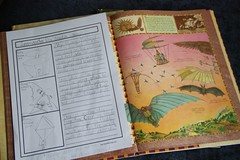
Narrating for High School Grades 9-12
Narrations are primarily written. I’m not at this stage yet, so I encourage you to visit Barb over at Harmony Fine Arts. She has some excellent posts on narrations for high schoolers. From what I’ve seen, high school narrations are going to become more in-depth, longer, and more polished, often becoming full-blown compositions.
The skill of narrating becomes the foundation for writing which is one of the primary goals of a high school education.
Notes
These transitions are gradual. On the first day of a new school year, you don’t suddenly demand something drastically different from what you ended the previous year with. Instead, you add a little more length to the reading assignment to be narrated, you require a little bit more from the narration, or you increase the number of written narrations in a week or in a day.
If you have a sixth grader who is still in the 3rd-5th grade category as I’ve outlined it, don’t panic. Just be deliberate about expecting a tad more each month until you are where you need to be. And only you can decide where “need to be” is. My outline may not fit your child. My friend Barb has a post with a similar topic as this one. Read her outline of narration expectations at A System of Narration.
Read More
Part 2 of the Narration Series: From Oral to Written
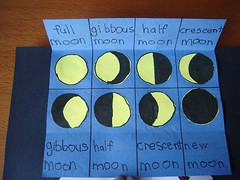
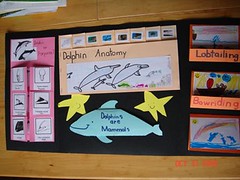

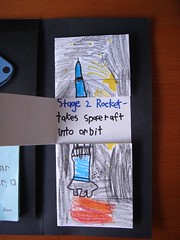
Great post and I love your images. I am going to link to this post soon because it does shows your family’s narration progression so well. Thanks for sharing your experiences with all of us readers.
Great post and a good summary. I often will write down my kids’ narrations at this point because that gives me a record of what they’ve done. Sometimes I will then have them copy what they’ve written.
these are great tips! i will link up to this page on my post today 🙂 hope it is okay!
Wow! Thanks. That is just the information I’ve been looking for. Thanks for including pictures with examples as well.
Jimmie, you are homeschooling us, homeschoolers, so well! 🙂
Many thanks for your advice.
Paula
Thanks so much, Jimmie! I really respect your expertise, and this is something that I’ve been thinking a lot about. My dds are going into 2nd grade and K, and I am feeling sort of unmoored as far as expectations go. I appreciate this!